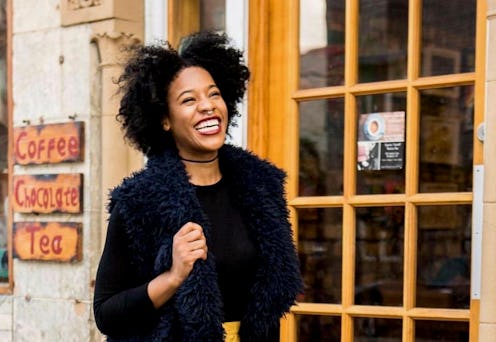Life
Celebrating Black History Month Is My Resistance

The rise of President Donald Trump and his cohorts has led civil rights icon Jesse Jackson to a terrifying conclusion: “50 years of civil rights have been threatened." The legendary civil rights activist lamented Trump’s attempt to repeal the Affordable Care Act, his anti-choice stance on abortion, and his support of voter suppression in a recent interview with People magazine. Jackson added: “We’re not going back.”
Now, as I sink my claws into Black History Month, Jackson’s words have come to my mind more times than I can count. Because he’s right — the Trump era is inherently an attack on the civil rights victories of past centuries. It pains me that as my friends, family, and I celebrate the lives of Martin Luther King Jr., Huey P. Newton, Ida B. Wells, Angela Davis and more, Nazis and white supremacists are crawling out of their holes and carrying out acts of hate in Trump’s name.
Black History Month has always been important to me as a Black woman, and I’ve always viewed it as a specific time to celebrate the accomplishments of my people. But with the rise of Trump and a political climate full of forceful bigotry, this February holds extra special significance for me.
Being Black in a nation that shuns Blackness is itself a form of protest.
To me, the very act of celebrating this Black History Month, and my Blackness along with it, is a form of resistance. And this year, especially, to wish my friends a happy Black History Month is to raise my fist in the air as I protest Trump’s presidency. I’d often heard that simply being Black in America is a form of resistance. I’d nod in agreement when I heard this, without actually internalizing the weight of such a statement. But now I understand. Being Black in a nation that shuns Blackness is itself a form of protest.
Growing up, I understood the particular plight of Black people in America — to the extent a child could understand such atrocities, at least. I understood that the N-word was "bad," and that any white person saying the word was being offensive and hateful. I learned that slavery was an evil, unforgivable event that must never be joked about or trivialized. These were the moral absolutes about America I had come to know, consciously or subconsciously. But now, the moral compass I had believed the nation had doesn't seem as real at all.
The election sparked a series of hate crimes against Black people and other marginalized groups — nearly 1,000 incidents of harassment and intimidation against the groups occurred in the 10 days following the election, according to the Southern Poverty Law Center. Men like Richard Spencer and Milo Yiannopoulos — both of whom have ties to the white nationalist alt-right movement — have made national headlines and nabbed speaking events at colleges.
Even before he officially became president, Trump’s plans had marginalization written all over them. His plans for the nation will disproportionately affect the poor and people of color. The Trump administration is looking to dramatically reduce federal spending — and of the various agencies on the chopping block, many are aimed at supporting women, people of color, and underserved communities. The administration is looking to cut funding for the Violence Against Women Act. The Minority Business Development Agency, the Civil Rights Division of the Justice Department, and the Legal Services Corporation (which helps poor Americans afford legal services) are also in danger. As a Black woman, I shudder when I think of how Trump’s presidency will affect me — and people like me — over the next few years.
As if these inhumane spending cuts weren’t enough, Trump has given Steve Bannon — the former Breitbart News chief who has given a platform to white supremacist beliefs — a permanent position on his National Security Council. He has also picked Jeff Sessions — who has a history of racism and voting against women’s rights — to be his attorney general.
All of these acts are a direct attack on Black people, especially Black women. I'm disheartened by these facts — and I'm fearful. Nothing startles me more than knowing that Jackson, one of the nation's most legendary civil rights leaders, is just as scared as I am. But seeing Trump pushing so hard against the liberation of Black people only prompts me to celebrate this month even more.
I have learned that the oppressed are a force to be reckoned with when we have nothing to lose. Trump is trying to take away the progress Black people have made. As Jackson said, "50 years of civil rights have been threatened." We don't have anything to lose.
I am no longer afraid to be radical, to disrupt and to fight for the change I wish to see in the world. I will call my white peers and associates out on their microaggressions. I will block roadways and shut down highways with my fellow protesters seeking justice. I will read and study revolutionary movements led by Black people in the past. I will use my slang, wear my natural hair, listen to my trap music, and be as unapologetically Black as possible.
That is what this Black History Month is about for me, celebrating my foremothers and forefathers while continuing the fight for true liberation. Now, as I soak in each day of this month, I’ll remember Jackson’s words: “We’re not going back.”